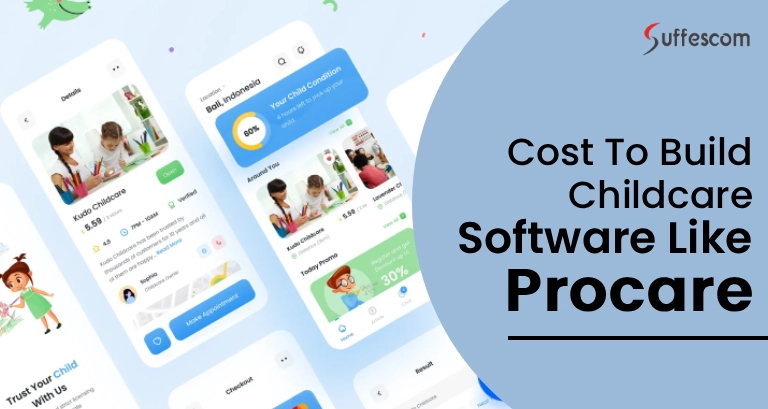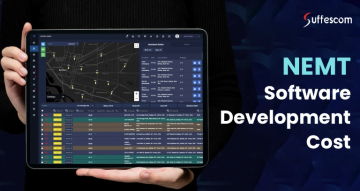How Much Does It Cost To Build Childcare Software Like Procare?

Running a childcare center in today's market is no small feat. We must keep parents updated and arrange staff schedules to meet safety standards. However, the workload often becomes overwhelming, and this is where advanced childcare management software steps in to simplify the problems.
Childcare platforms such as Procare have transformed the industry by combining all key functions into one centralized system. It manages attendance tracking, meal planning, secure parent communication, and more.
For childcare businesses, it is a competitive advantage that directly impacts enrollment, efficiency, and reputation.
According to Research and Markets, the Global market for childcare management was estimated at US$251.5 million in 2024 and expected to reach US$380.5 million by 2030 with a CAGR of 7.1%.
The big question most business owners ask is, "How much does it cost to create a childcare management app like Procare?" The investment is based on features, platforms, and customization levels. Considering the cost breakdown will help you budget smartly and plan for long-term ROI.
In this blog, we'll explore the exact factors that influence the cost, share strategies to keep expenses under control without compromising quality, and highlight why now is the ideal time to invest in a Procare-like childcare app.
What is Procare and Why Businesses Choose It ?
Procare is a leading childcare management platform designed to supervize and automate the daily operations of daycare centers, preschools, and after-school programs.
Providers can manage attendance, billing, communication with parents, and compliance tracking in one system. Using tools like Procare removes the need for multiple tools. It saves time and reduces errors associated with manual processes.
Procare stands out because it matches technology with childcare needs, making management easier and operations smoother. The platform strikes a balance between administrative efficiency and service quality. It provides operators a competitive advantage in a market where trust and reliability are crucial.
Build the Best Procare Clone Today
Start your Procare Clone development journey and give daycare operations a smarter, faster, and more reliable platform.
What is the Essential Feature Set of a Procare Clone?
The following core features make the Procare clone highly efficient, making it a smart choice for childcare businesses looking for a reliable app development service.
1. Child Attendance Tracking
The system automatically tracks when children arrive and leave, and generates reports for staffing, billing, and compliance. This means fewer mistakes, quicker headcounts, and clear records for parents.
Features like biometric scans or QR check-ins also help speed up sign-ins during busy hours.
2. Billing and Invoicing
It is a central billing system that simplifies payment handling by generating invoices, processing payments, and sending automated reminders. This lowers outstanding receivables, improves timely cash flow, and reduces administrative expenses.
3. Parent Communication Portal
A parent communication portal helps families to stay connected with the childcare center in real time. It allows parents to receive updates, daily activity logs, and important announcements through a secure app. This improves transparency, builds trust, and minimizes the need for manual calls or emails.
4. Curriculum Management
This functionality enables centres to organize, collaborate, and monitor lesson plans in line with learning objectives. To operators, it ensures consistency in quality within classrooms, facilitates ease of performance audits, and allows for rapid induction of new employees into your learning system, thus safeguarding your brand image.
5. Health & Safety Compliance Tracking
Built-in modules to ensure compliance, including record health checks, allergies, incident reports, and safety drills. This isn't just a matter of protecting children, but also guarding your business from potential legal issues.
Health safety, and compliance management ensure your operations meet local and federal standards for childcare, which can directly impact licensing and funding.
6. Child Progress Report
Enable caregivers to record the child's learning milestones, skills, and daily activities in one place. Progress reports include notes, photos, and developmental updates, which are shared with parents in real time. It helps parents stay informed about their child's growth.
Procare Childcare Management Software Features
As the childcare sector continues to grow, build apps for daycare providers with advanced functionality can significantly enhance operational efficiency. Features like IoT integration and smart meal planning ensure a highly engaging experience.
1. AI-Based Child Activity Predictions
Through the study of historical data and daily activity logs, AI can forecast a child's behavioral patterns, such as times of high energy or probable involvement in specific activities. It can be utilized by teachers to prepare lessons, distribute resources efficiently, and provide more personalized support.
2. Real-Time CCTV Monitoring
Integrating CCTV with live streaming capabilities enables parents and administrators to remotely monitor classrooms and provide a secure environment. It reinforces trust and safety, particularly for centres dealing with infants and toddlers.
3. Smart Meal & Nutrition Planning
An intelligent nutrition planner can even create weekly food timetables automatically, tailored to children's age, diet restrictions, and nutritional requirements. This maintains adherence to health recommendations while also providing relief to parents regarding the child's food.
4. IoT Integration
Devices integrated with IoT, including smart wearables, may monitor a child's location, temperature, or even sleep patterns. Real-time monitoring introduces a safety layer, enabling staff to respond promptly to emergencies.
5. Multilingual Parent Communication
Multilingual messaging capabilities enable centers to communicate effectively with parents who speak languages other than English. It promotes inclusivity and prevents misunderstandings, particularly in multicultural areas.
6. Automated Incident Reporting
In case of an incident or behavioral problem, staff are able to record information immediately with pre-configured templates. Automated reports are then available for parents and government agencies, assuring accuracy, compliance, and prompt reporting.
Detailed Breakdown of Cost for Procare Clone Development
Building a Procare clone requires having a clear understanding of the various cost elements involved. Generally, companies can expect the overall procare clone cost to range between $5,000 and $15,000.
The investment is highly dependent on multiple factors that make the final product functional, secure, and scalable.
Factors Influencing the Cost of Procare Clone Development
Several key factors contribute to the overall development cost. It is beneficial for companies to consider each factor in detail when arranging the budget.
1. Platform (Web, iOS, Android)
The choice of platform significantly affects costs. Building for a single platform, such as web or mobile (iOS/Android), will be more cost-effective than a multi-platform solution. However, providing Procare clone across all major platforms boosts reach and accessibility.
2. Feature Sophistication
Basic functionalities, such as parent communication, billing, and attendance management, take less time to implement, thereby keeping costs low. However, when implementing advanced functionalities such as IoT devices, live CCTV, or AI-based child activity prediction, complexity arises, and with it, the development time and cost increase automatically. Firms must prioritize features to achieve optimal value versus cost.
3. UI/UX Design Customization
A user-friendly, well-designed interface is essential for satisfaction among childcare staff and parents. Custom UI/UX design aligns with your brand identity and requires additional design effort that impacts the overall budget. Quality design investment improves user experience and saves time after launch.
4. Third-Party Integrations
Third-party service integrations, such as payment gateways, messaging applications, or analytics packages, can incur costs in terms of both development time and potentially related licensing fees. The choice of a scalable third-party service provides long-term stability without artificially inflating costs.
5. Cloud Hosting & Data Security
Since childcare software handles sensitive data, robust cloud hosting and effective data security measures are essential. Fees in this regard include server fees, encryption, and compliance with policies such as GDPR or COPPA. Although this is an added expense, it protects your business from data breaches and legal issues.
6. Estimated Procare Clone Cost Range
Taking all things into account, the Procare clone development cost generally ranges from $5,000 to $15,000. This figure is a proper balance approach between functionality, personalization, security, and scalability. It enables companies to offer a reliable childcare management solution without going over budget.
Discover the Real Cost of Procare Clone
Get a transparent breakdown of the cost of Procare Clone based on your specific features, integrations, and business goals.
How Does the Procare Clone Development Process Work?
Developing a Procare clone that is robust and scalable requires a structured development process. It should be customized to the specific requirements of childcare businesses. Every stage ensures that the end solution not only meets market needs but also delivers operational excellence.
1. Requirement Analysis & Planning
The journey of development starts with thorough requirement planning and analysis. This process involves collaborating with business stakeholders to identify key requirements, such as attendance management, billing systems, and parent communication functionalities.
A well-defined project roadmap is established, including timelines, milestones, and technical specifications, to ensure the successful management of the Procare clone development.
2. UI/UX Design
Creating an intuitive and interactive UI/UX is of utmost importance. UI/UX designers strive to create interfaces that are simple to use for both parents and childcare personnel, ensuring high uptake. Custom branding features are integrated to depict your center's persona, establishing professionalism and trustworthiness.
3. Core Feature Development
After designing comes the development phase. This entails coding critical functionality like tracking children's attendance, billing and invoicing, scheduling staff, and rudimentary reporting dashboards. The purpose is to create a solid base for facilitating smooth day-to-day childcare operations.
4. Advanced Feature Integration
After the core modules, the project moves to advanced feature integration. In this phase, advanced features such as AI-driven child activity forecasting, real-time CCTV integration, IoT-based check-ins, and multilingual parent communications are integrated. These features make your Procare clone stand out by increasing efficiency, safety, and user experience.
5. Testing & Quality Assurance
Before release, there is intensive testing and quality control. It includes functional testing, security checks, and performance tests to ensure the software operates flawlessly under various conditions. It operates in accordance with industry regulations, such as GDPR and COPPA, which ensure that user data and brand image are secure.
6. Deployment & Post-Launch Support
Lastly, the platform is released to app stores or cloud servers according to the delivery model.
Even the most well-designed childcare platform requires regular mobile app maintenance to address bugs, keep pace with technological advancements, and adapt to evolving business requirements.
Cost Comparison: Building from Scratch vs. Using Procare App API
If you're planning a childcare app like Procare, you'll face one big question early on. Do you want to start from scratch, or do you connect with the Procare API? Both work. But the experience and the outcome will be different.
1. Building from Scratch
Starting fresh gives you complete control. You decide how the design looks. You choose the exact features. You can even shape how the app grows over time.
Want advanced reports? Add them in. Do you need detailed customer management or live video updates for parents? No problem.
The trade-off is cost and time. This route usually runs between $5,000 and $15,000. And once it’s live, you’ll still need to budget for updates and fixes.
2. Procare API Integration
Even with an API-based setup, you will need ongoing mobile app maintenance to keep features running smoothly. Going with Procare’s API is a faster and cheaper option. In most cases, the cost falls within the $8,000 - $12,000 range.
You get ready-made tools, such as attendance tracking, payment handling, and daily reports, without having to build them from scratch.
The downside? You’re working within Procare’s framework. That means customization is limited. Unique or highly specific features might be harder to add.
3. Which to Choose?
The decision should align with budget, timeline, and the mobile app life cycle from launch to ongoing upgrades. If speed matters most, API integration is a clear win. But if you want something fully tailored to your vision, building from scratch is worth the wait.
How to Reduce the Cost of Procare Clone without Compromising Quality?
Building a feature-rich Procare clone can be a significant investment. There are numerous smart strategies that businesses can adopt to manage costs effectively. Below are some proven approaches to optimize the budget:
1. MVP Approach
Starting with an MVP includes the most essential features, such as attendance tracking, billing, and parent communication. It minimizes initial development time and cost while validating the product in the market.
2. Using White Label Solutions
White label childcare software offers a ready-made platform that can be personalized with your branding and select features. It reduces development time and expense, as the core technology is pre-built and tested.
3. Outsourcing to Experienced Childcare Software Developers
Partnering with a software development company can lower costs compared to building an in-house team. Outsourcing helps to get skilled professionals who understand the feature requirements.
Final Thoughts!
A Procare clone can be a game-changer for childcare centers. It keeps all records in one place, so daily tasks become easier. This means less stress for staff and more time for children. Plus, parents stay connected and informed, which builds trust.
Now, choosing between a custom build and Procare API comes down to three things that is budget, time, and control. If you require full flexibility, custom development is the ideal solution. But if speed and cost matter more, API integration is a smart shortcut.
This is where a skilled childcare app development company can guide you. They can assess your needs, recommend the right approach, and handle the technical work. With the right partner, you will get a long-term solution for growth.
FAQs
1. What is a Procare clone, and how is it different from developing software from scratch?
A Procare clone is a ready-made childcare management solution. It is designed according to the features, workflows, and overall structure of the Procare app. It is faster to set up, less costly to create, and easier to tweak to suit your needs.
2. How long does it take to develop a Procare clone?
On average, it takes about 6-10 weeks from start to finish. The exact timeline depends on the level of features, customization, and the integrations needed during development.
3. Can we customize a Procare clone for our childcare center's requirements?
Absolutely, the Procare clone is flexible. You can adjust it to match your center’s operations, branding, and compliance rules.
4. How secure is a Procare clone for the storage of childcare and parent information?
Security can be built to enterprise standards. This includes strong data encryption, secure cloud hosting, role-based access controls, and full compliance with local data privacy laws.
5. What are the advantages of building a Procare clone versus a generic childcare management system?
A Procare clone offers several key advantages. You’ll save on development costs, launch your platform sooner, and have a system that can grow with your center. It also consolidates all your operations into one place, making it easier to keep parents engaged through real-time updates.
6. Can a Procare Clone handle several childcare center branches?
Yes, A Procare Clone can scale to manage multiple branches while keeping data centralized. Role-based permissions make sure each staff member only sees the information they need. This keeps operations organized, even when you’re managing multiple locations simultaneously.







